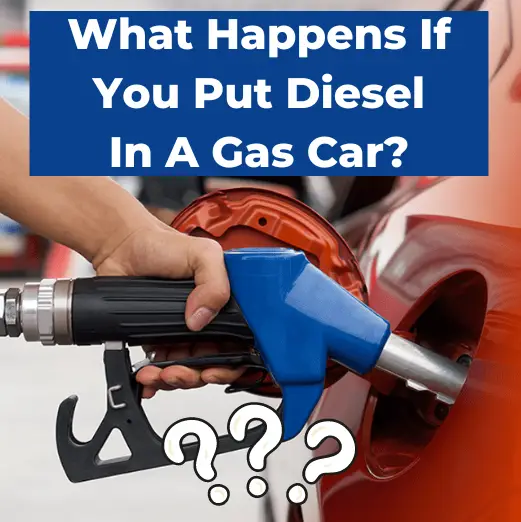Accidents can happen, and one such unfortunate event could be putting diesel fuel into a car that runs on gasoline. Although it doesn’t occur frequently, when it does, it has the potential to cause significant damage to your vehicle and result in expensive repairs. Understanding the consequences and knowing how to respond can save car owners from aggravating situations and costly solutions.
When diesel is introduced into a gasoline-powered vehicle, several issues may arise due to the distinct compositions of these fuels. Since diesel fuel is thicker and denser than gasoline, the car’s fuel pump will struggle to move the diesel/gasoline mixture through the system and the diesel will have difficulty passing through the fuel filter, often clogging it up. Furthermore, diesel fuel has a lower octane rating than gasoline, which can lead to engine damage and other adverse effects on the vehicle’s performance.
The consequences of using the wrong fuel type can be quite severe, with repairs ranging from a few thousand dollars up to $17,000 in some cases, sometimes exceeding the value of the car itself. Thus, it is essential for car owners to be vigilant when refueling and take immediate action if such a mishap occurs.
Understanding Diesel Fuel and Gasoline
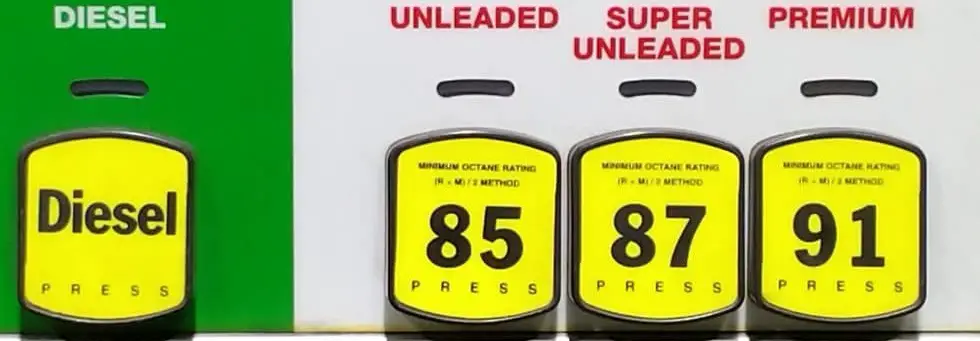
Combustion Properties
Diesel fuel and gasoline are both derived from crude oil but have distinct combustion properties. Diesel fuel is heavier and has a higher energy density compared to gasoline, which means it can produce more energy per unit of volume. Diesel engines work by compressing air and then injecting diesel fuel into the compressed air, leading to autoignition and engine power. On the other hand, gasoline engines ignite the fuel-air mixture via spark plugs.
The different combustion properties of diesel and gasoline have implications on the design and operation of engines. For instance, diesel engines are generally more fuel-efficient than gasoline engines, partly due to their higher energy content and different combustion process. Meanwhile, gasoline engines can rev higher than diesel engines, often resulting in higher overall horsepower ratings.
Octane Rating
Octane rating is a measure of a fuel’s resistance to knocking or premature ignition during combustion in a gasoline engine. Higher octane ratings indicate better anti-knock performance, allowing the engine to run more efficiently without experiencing knocking issues.
Gasoline has a higher octane rating than diesel fuel, typically ranging from 87 to 93 for regular or premium grades, while diesel fuel has an octane rating between 25 to 40. However, it is important to note that the octane rating only applies to gasoline engines and isn’t relevant in the context of diesel engines, as they rely on fuel autoignition due to compression rather than spark ignition.
Understanding the differences between diesel fuel and gasoline, such as their combustion properties and octane ratings, helps one to grasp why putting diesel in a gas car can lead to engine problems.
Gasoline engines are designed to work with fuels that have specific combustion properties and octane ratings, and using diesel fuel in such engines is likely to cause inefficient combustion and potential damage.
The Process of Diesel in a Gas Car
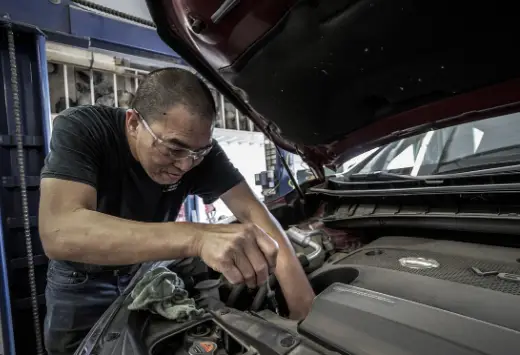
Fuel System Contamination
Accidentally putting diesel in a gas car can lead to fuel system contamination. Since diesel fuel is thicker and denser than gasoline, the fuel pump will struggle to move the diesel/gasoline mixture through the system. The diesel will not be able to easily pass through the fuel filter, and instead, it will clog up the fuel filter.
In addition to clogging the fuel filter, diesel fuel can also damage other components in the fuel system, such as fuel injectors. This is due to the different properties of diesel and gasoline, which are meant to work with specific engine types.
Engine Damage
The presence of diesel in a gas engine can lead to significant engine damage. Since diesel and regular gas have different properties, they should not be used in the same engine as they can cause combustion problems. Diesel fuel has a higher flash point, meaning it requires more heat and pressure to ignite. Gasoline engines are not designed to handle the combustion characteristics of diesel fuel, which can lead to poor performance and potentially severe engine damage.
When diesel fuel enters the combustion chamber of a gas engine, it may not ignite properly, leading to an incomplete burn and the creation of harmful carbon deposits. As a result, components such as spark plugs and oxygen sensors may become fouled, reducing engine efficiency and potentially causing the check engine light to come on.
In extreme cases, the presence of diesel in a gas car can lead to a phenomenon called hydrolock, where the diesel fuel fails to ignite and instead forms a liquid that cannot be compressed by the engine’s pistons. This can cause a sudden stop of the engine, resulting in bent or broken internal components and costly repairs.
Effects on Specific Parts
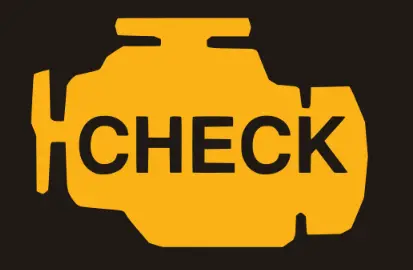
Injectors and Fuel Pump
When diesel is accidentally put into a gasoline engine, it can cause significant harm to the injectors and fuel pump. Diesel fuel is thicker and denser than gasoline, making it more difficult for the fuel pump to move the diesel/gasoline mixture through the system. This stress on the fuel pump can lead to failure over time. Additionally, the fuel injectors, which are designed to handle gasoline’s fine mist, may become clogged or damaged by the thicker diesel fuel, resulting in poor engine performance or even engine failure.
Catalytic Converter and Spark Plugs
The catalytic converter and spark plugs can also be negatively affected by diesel fuel in a gasoline engine. The catalytic converter, an essential component in reducing exhaust emissions, relies on specific combustion temperatures and reactions to function properly. Introducing diesel fuel to the gasoline engine can disrupt these processes, potentially causing damage to the catalytic converter. Furthermore, diesel’s different combustion properties can lead to fouling and damage of the spark plugs, which are crucial for igniting the fuel-air mixture in a gasoline engine. This damage can manifest as poor engine performance and, in severe cases, complete engine failure.
Realizing the Mistake at the Gas Station
Noticing Diesel Nozzle Size
It is crucial to be cautious when refueling your vehicle at the gas station, as mixing up fuel types may result in severe consequences. One of the ways gas stations help keep diesel out of gasoline vehicles is by making diesel nozzles different from gas nozzles. Diesel pump nozzles are generally larger in size, making it difficult to fit them into the fuel tank of cars that run on gasoline.
Despite this precaution, mistakes still happen. Drivers should be aware of the different nozzle sizes and colors, as diesel nozzles often have a distinctive color such as green or yellow. Additionally, there may be clear labels on the pump to prevent confusion between fuel types.
Driver’s Awareness
A driver’s heightened awareness plays a vital role in preventing diesel fuel from entering a gasoline car’s tank. They should always double-check the type of fuel they are using before starting to refuel. If one mistakenly begins to pump diesel into a gasoline car’s tank, they should stop immediately and notify a gas station attendant.
In case a driver realizes their mistake after filling the tank with diesel, they should avoid starting the engine. Turning on the engine could cause diesel fuel to circulate through the car’s fuel system, leading to clogs and potential damage to fuel filters and injectors.
In conclusion, understanding the differences in diesel and gas nozzles, being aware of the fuel type, and promptly responding to any mistakes can help protect the vehicle from damages resulting from accidental diesel fueling.
Immediate Actions to Take

Switch Off the Engine
If you accidentally put diesel in your gas car, it is crucial to turn off the engine immediately. Diesel fuel is denser than gasoline, and allowing it to circulate through your engine can cause significant damage. Do not attempt to drive the vehicle, as this can lead to further complications such as clogging of the fuel system or engine damage.
Call for a Tow Truck
Once you have switched off the engine, the next step is to call for a tow truck. It is essential to have your car towed to a professional mechanic or service center to properly remove the diesel fuel from your gas car. They will drain the fuel tank, flush the fuel lines, and replace the contaminated fuel filter. This process ensures that your vehicle is safe to operate once again, minimizing the risk of serious damage to the engine or other components.
Repairing A Diesel-Contaminated Gas Car
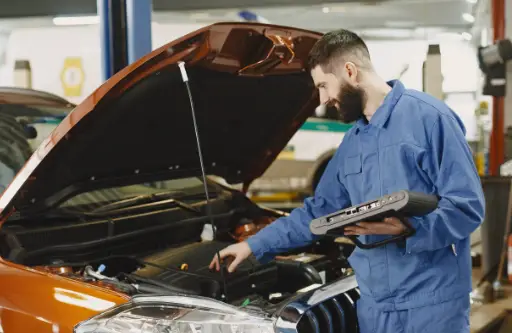
Draining the Tank
If diesel has been accidentally added to a gas car, the first step in repairing the vehicle is to drain the tank. This is done to remove the diesel and contaminated gasoline from the fuel system. In most cases, a garage or mechanic will handle this process, as it requires specialized equipment and knowledge. Draining the tank may result in additional costs that vary depending on the vehicle’s make and model.
Cleaning Fuel System Components
After draining the tank, the vehicle’s fuel system components need to be cleaned thoroughly. These components include fuel filters, fuel lines, and fuel injectors.
- Fuel Filters: Diesel-contaminated gasoline can clog the fuel filters in the car, as diesel has a different consistency than regular gasoline. Replacing fuel filters is essential to ensuring that the fuel system remains clean and functions properly.
- Fuel Lines: Contaminated fuel lines can lead to restricted fuel flow and poor engine performance. Mechanics will typically flush the fuel lines to remove any residual diesel and debris. In more severe cases, it may be necessary to replace the fuel lines altogether.
- Fuel Injectors: Diesel contamination can also cause issues with fuel injectors, as the thicker diesel fuel can clog them. Injectors play a vital role in delivering fuel to the engine, and clogged injectors may result in decreased performance and potential engine damage. A mechanic will often clean the injectors, and in some instances, replace them if they have been severely damaged.
While repairing a diesel-contaminated gas car can be a time-consuming and potentially expensive process, it is crucial to address the issue promptly. Failure to do so can lead to more serious engine damage and even render the vehicle inoperable. It is always recommended to consult with a professional mechanic or garage when dealing with such fuel-related issues.
Preventive Measures
Checking Fuel Type Label
One way to avoid putting diesel in a gasoline-powered vehicle is by checking the fuel type label. This label is typically located near the gas cap or on the inside of the fuel door and will clearly indicate the recommended fuel type for the vehicle. Make sure to always double-check this label before filling up, especially when driving an unfamiliar car.
Paying Attention at Gas Stations
Another preventive measure is to stay vigilant at gas stations. Many gas stations have color-coded nozzles to help drivers differentiate between diesel and gasoline fuel. Diesel nozzles are usually larger and may not fit in the filler neck of a gasoline vehicle. Paying close attention to the type of nozzle you pick up and the accompanying label on the pump can potentially save you from costly mistakes and extensive repairs.
Additionally, it’s essential to familiarize yourself with the specific type of fuel your vehicle requires, as well as the appropriate octane rating. Gasoline engines typically operate on fuel that has an octane rating of 87-91, which affects its ability to resist knocking or pinging. Knowing this information can help you choose the correct fuel when visiting a gas station.
Following these preventive measures can help you avoid accidentally exposing your vehicle’s engine to diesel and save you from costly and extensive repairs. Being aware of the fuel type label, staying attentive at gas stations, and knowing your vehicle’s specific fuel requirements can prevent the potential damage that may occur from putting diesel in a gasoline-powered car.
Frequently Asked Questions
It depends on the amount of diesel fuel and how long the engine runs with it. Diesel fuel has a lower octane rating, which can harm a gasoline engine and, in extreme cases, could damage it significantly. The more diesel fuel in the gas tank and the longer the engine runs, the higher the risk of damage.
If you realize you’ve put diesel in a gas car, stop driving immediately. Switch off the engine to avoid further damage and call a tow truck to have your vehicle taken to a professional mechanic. They will need to drain the fuel tank, flush the lines, and replace the fuel filter.
Some signs that you may have diesel fuel in your gas car include difficulty starting it, poor acceleration, unusual engine noises, and excessive exhaust smoke. The engine might also stall or feel generally unresponsive.
It’s best not to drive at all if you know you’ve put diesel in a gas car. Driving even a short distance can cause significant damage to the engine, fuel system, and other components, leading to expensive repairs.
The cost of repairing the damage caused by putting diesel in a gas car can vary widely, with most repairs ranging from $4,000 to $17,000, depending on the extent of the damage. In some cases, the repair cost can exceed the value of the car itself.

